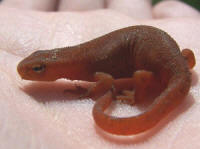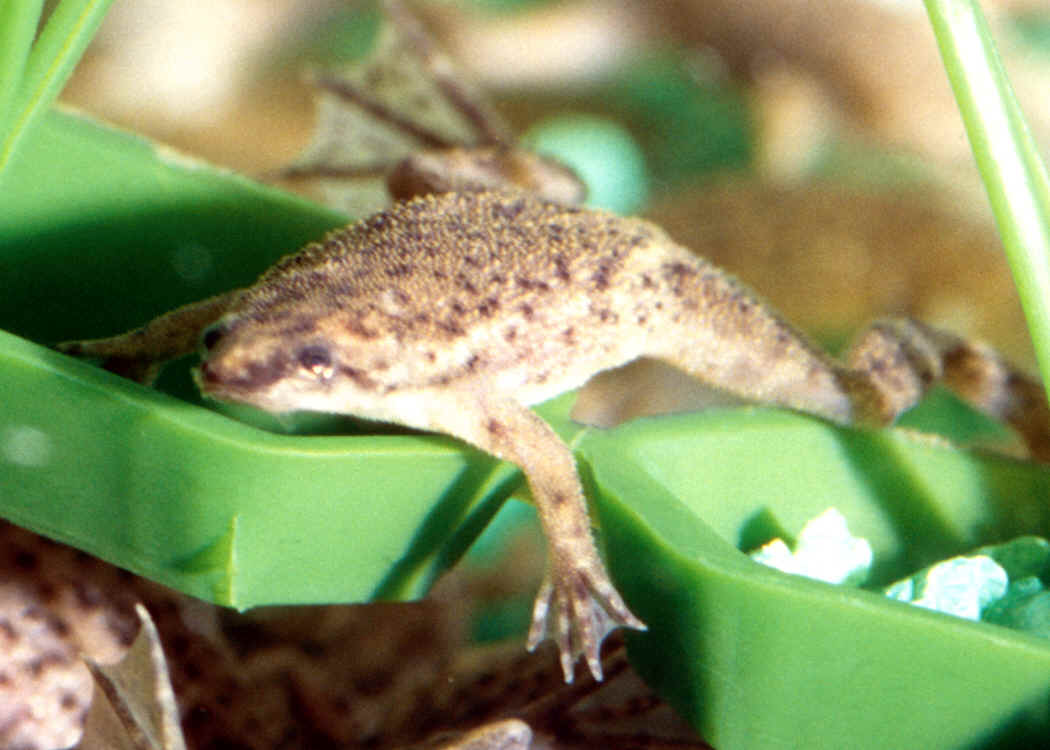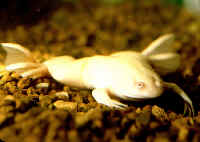Amphibians: Frogs, Toads, Newts
and Salamanders
FAQs on: Amphibians,
Amphibians 2,
FAQs on:
Amphibian Identification,
Amphibian Behavior,
Amphibian Compatibility,
Amphibian Stocking/Selection,
Amphibian Systems,
Amphibian Feeding,
Amphibian Disease,
Amphibian Reproduction,
FAQs by Species/Groups:
Frogs Other Than African and Clawed,
African Dwarf Frogs,
Newts & Salamanders (plus see
below),
Rubber Eels/Caecilians,
Frogs & Toads:
Anurans, Frogs & Toads
FAQs on: Frogs
Other Than African and Clawed 1,
Frogs other Than African & Clawed 2,
FAQs on: General
Frog Identification, General
Frog Behavior, General Frog
Compatibility, General Frog
Stocking/Selection, General
Frog Systems, General Frog
Feeding,
General Frog Health,
General Frog Reproduction,
FAQs by Species/Groups:
Bullfrogs, Fire Belly Toads,
Leopard Frogs,
Surinam Toads/Pipa,
Tadpoles of all Sorts,
Toads/Terrestrial Frogs,
White's Tree Frogs,
Keeping
African Clawed Frogs and African Dwarf Frogs by Neale Monks,
FAQs on:
African Dwarf
Frogs and African Clawed Frogs,
African Dwarf Frogs (ADFs), Genus
Hymenochirus
FAQs on:
African Dwarf
Frogs 1,
African Dwarf
Frogs 2,
FAQs on: ADF Identification,
ADF Behavior,
ADF Compatibility,
ADF Stocking/Selection,
ADF Systems,
ADF Feeding,
&
FAQs on African Dwarf Frog Disease:
ADF Health/Disease 1,
ADF Health 2,
ADF Health 3,
ADF Health 4,
FAQs on African Dwarf Frog Disease by Category:
Diagnosis,
Environmental, Nutritional,
Social, Trauma,
Infectious (Virus,
Bacterial, Fungal), Parasitic,
Treatments,
FAQs on African Dwarf Frog Reproduction/Breeding:
ADF Reproduction,
Xenopus laevis, the
Eat'em Uppers we call African Clawed Frogs (ACFs)
FAQs on:
African Clawed Frogs,
FAQs on: Xenopus
Identification, Xenopus
Behavior, Xenopus
Compatibility, Xenopus
Stocking/Selection, Xenopus
Systems, Xenopus Feeding,
&
FAQs on Xenopus Disease:
Xenopus Disease 1,
Xenopus Health 2,
Xenopus Health 3,
Xenopus Health 4, Xenopus
Health ,
FAQs on Xenopus Disease by Category:
Diagnosis,
Environmental,
Nutritional,
Social, Trauma,
Infectious (Virus, Bacterial, Fungal),
Parasitic,
Treatments,
FAQs on Xenopus Reproduction/Breeding:
Xenopus Reproduction,
Newts & Salamanders:
Urodelans: Amphibians w/ Tails; Newts, Salamanders,
FAQs on:
Newts &
Salamanders,
&
FAQs by Groups/Species: Axolotls,
Eastern Newts
(Notophthalmus viridescens),
Efts, Fire Belly Newts,
Hellbenders, Paddletail Newts,
Sirens,
Tiger Salamanders,
Water Dog/Mudpuppies,
Rubber Eels:
Caecilians & FAQs on:
Rubber Eels/Caecilians,
|
Turtles... Please read
through the following before writing us:
|
Freshwater Turtles
1.
Caring for your turtle: Turtles don’t need
much, but what they do need they MUST have! Read our Basic Care guide
here:
http://www.wetwebmedia.com/FWSubWebIndex/RESCareBarton.htm
2.
What should I feed my turtle?
·
See link above to our Basic Care guide for
specific feeding instructions.
·
Green foods for turtles
http://www.redearslider.com/plants.htmlThis article lists some healthy plants you can
give your turtle as a supplement to his main diet (see Basic Care guide
above for more info on diet).
Many freshwater turtles are omnivores and eat a
substantial amount of plant material in the wild. Plants account
for 50% of the diet of juvenile red-ear sliders in the wild, and
more than 75% of the diet of the adults.
3. I
think my turtle may need to lay eggs. What should I do? This article describes some of your options: http://www.wetwebmedia.com/FWSubWebIndex/TurtleReproArtDarrel.htm
4. Is
your turtle sick? Read here first before contacting
us –
·
A home care guide for the most common illnesses*:
http://www.wetwebmedia.com/FWSubWebIndex/treating%20RES%20Dis%20DarrelB.htm*Note: These
are only general guidelines. If this is an emergency or your turtle is
gravely ill, he (or she!) should be seen immediately by a qualified
veterinarian for a thorough examination of his physical condition and
behavior.
·
Labored breathing, wheezing, mucus from the nose/mouth*:
http://www.wetwebmedia.com/FWSubWebIndex/turtrespart.htm*This condition needs prompt veterinarian attention
as it can quickly deteriorate.
·
Swollen or closed eyes:
http://www.wetwebmedia.com/FWSubWebIndex/turteyedisart.htmThis is a common condition when turtles are
kept improperly; in particular when the diet is lacking in Vitamin A.
Depending on the severity and the presence of other symptoms it may
also require prompt veterinarian attention, as well as a review of diet
and environmental conditions.
·
Shells smelly and/or rotting:
http://www.wetwebmedia.com/FWSubWebIndex/turtshellrot.htmShell rot is a common problem when turtles are kept in
dirty water, are lacking key nutrients in their diet, and/or when they
don’t have a source of
UV-B light, which is essential for the proper growth of
their shell plates. Treat/clean the shell, then fix the environmental
conditions.
How and where to write us for help:
About Asking the
WWM Crew a Question
|
Turtles: General, Systems,
Feeding, Reproduction...
|
Turtles & Reptiles, Care &
General Information, by Sue Garrett,
Turtles, Sliders, Tortoises, the
Chelonians,
FAQs on: Turtles 1, Turtles
2,
Turtles, ID/Physical
Attributes (Species ID, Sexing, Aging), Part 1,
Part 2,
Part 3,
by Sue Garrett,
Guidelines for ID Questions
by Lynn Zurik,
ID Guide Flowchart by Lynn Zurik,
FAQs on Turtle Identification: Turtle
Identification 1, Turtle ID 2,
Turtle ID 3,
Turtle ID 4, Turtle ID 5, Turtle ID
6, Turtle ID 7, Turtle ID 8, Turtle ID ,
FAQs on
Turtle Behavior: Turtle
Behavior 1, Turtle
Over-Wintering/"Hibernation"/Brumination, &
Turtle Stocking & Compatibility Part
1,
Part 2,
Part 3,
by Sue Garrett
FAQs on Turtle Compatibility: Turtle
Compatibility 1,
FAQs on Turtle Stocking, Selection:
Turtle
Stocking/Selection 1,
Turtles and Other Animals for Ponds
FAQs on:
Pond Turtles,
Turtle Systems (to be written, placed)
FAQs on Turtle Systems:
Turtle Systems 1,
Turtle Systems 2,
Ponds and
Turtles, ,
FAQs on: Turtle
Enclosures, Turtle System
Filtration/Cleaning, Turtles
& Light (UV plus), Turtle
System Heating/Cooling,
Turtle Substrates & Decor,
Aquatic Turtle Basking Areas,
Turtle System
Maintenance/Holidays,
Overwintering Environments, &
Turtle Foods/Feeding/Nutrition (to be
written, placed)
FAQs on Turtle Foods/Feeding/Nutrition:
Turtle Feeding 1 ,
RES Feeding,
Turtle Holiday/Vacation Feeding,
Turtle Health (see next tray below),
FAQs on Turtle Reproduction:
Turtle Reproduction 1, RES
Reproduction/Young
YBS Reproduction/Young,
(plus see below),
|
Turtles by Species
|
|
FAQs by Species :
Musk/Mud Turtles, &
Painted Turtles,
Map Turtles
(Graptemys spp.), ( Other
Aquatic Emydids (Bog, Cooters, Pond, Wood, Map...),
Softshells,
Snapping Turtles,
Mata Matas,
Other Side/Snake Neck Turtles,
Terrestrial Turtles/Tortoises
(Including Box, Wood Turtles,), Terrapins
Red Ear Slider Care
by Gage Harford,
The Care and Keeping of the Red Eared Slider,
Trachemys scripta elegans by Darrel Barton,
FAQs on:
RESliders 1, RESliders 2,
RESliders 3,
RESliders 4,
RESliders 5, RESliders ,
FAQs on: Red Eared
Slider Identification, RES
Behavior 1,
RES Behavior 2,
RES Behavior 3,
RES Behavior 4, &
RES Compatibility,
RES Stocking/Selection,
RES Systems,
RES Systems 2,
RES Systems 3,
RES Systems 4,
RES Systems 5, RES Systems , &
RES Feeding, RES Health (see
below), & RES
Reproduction/Young (plus see below), RES Reproduction , RES
Reproduction , RES Reproduction , RES Reproduction ,
Yellow Bellied
Sliders/Cooters (Trachemys & Pseudemys spp.) (to be written)
FAQs on: Yellow
Bellied Sliders/YBS/Cooters 1, YBS
2,
YBS 3,
YBS 4,
FAQs on: YBS ID,
YBS Behavior,
YBS Compatibility,
YBS Selection,
YBS Systems,
YBS Feeding,
YBS Disease,
YBS Reproduction/Young,
|
Other Reptiles
FAQs on: Other
Aquatic Reptiles,
Non-Aquatic
Reptiles,
Terrestrial Turtles/Tortoises (Including Box, Wood Turtles,),
Treating Common Illnesses of the Red Ear Slider, RES (& other
Emydid Turtles) by Darrel Barton,
FAQs on: Turtle
Disease 1, Turtle Disease 2,
Turtle Disease 3, Turtle
Disease 4, Turtle Disease 5, Turtle Disease 6, Turtle Disease ,
FAQs on Turtle Health by Type:
Diagnosis,
Environmental,
Traumas,
Social,
Nutritional,
Growths/Tumors,
Infectious,
Parasitic,
References,
Red Eared Slider Disease
FAQs on RES Health:
Red Eared Slider (RES) Disease 1,
RES Disease/Health 2,
RES Disease 3,
RES Health 4,
RES Health 5,
RES Health 6,
RES Health 7,
RES Health 8,
RES Health 9,
RES Health 10,
RES Health 11,
RES Health 12,
RES Health 13, RES Health , <Plus
see below re Shell Conditions>
FAQs on RES Health by Type:
Diagnosis,
Environmental,
Traumas,
Social,
Nutritional,
Growths/Tumors,
Infectious,
Parasitic,
Treatments,
References,
Turtle eye
diseases; Recognising and treating eye diseases in pet turtles
by Neale Monks,
FAQs on:
Turtle Eye Disease,
So your turtle has
the Flu? Recognizing and treating respiratory infections in pet turtles
by Neale Monks,
FAQs on:
Turtle Respiratory Disease,
Shell Rot & Other Shell
Conditions in Turtles by Gage Harford
Shells smelly and/or rotting:
http://www.wetwebmedia.com/FWSubWebIndex/turtshellrot.htm
Shell rot is a common problem when turtles are kept in
dirty water, are lacking key nutrients in their diet, and/or when they
don’t have a source of
UV-B light, which is essential for the proper growth of
their shell plates. Treat/clean the shell, then fix the environmental
conditions.
FAQs on:
Shell Rot and Conditions 1,
Shell Rot, Conditions 2,
Shell Rot, Conditions 3,
Shell Rot, Conditions 4,
Shell Conditions 5,
Shell Conditions 6,
Shell Conditions 7,
Shell Conditions 8,
Shell Conditions 9,
Shell Conditions 10,
Shell Conditions 11,
Shell Conditions 12,
Shell Conditions 13,
Shell
Conditions 14,
Shell Conditions 15,
Shell Conditions 16,
Shell Conditions 17, Shell Conditions ,
Turtle Medications:
Vitamins, Sulfa Drugs, Salts (not!),
|
Turtle Reproduction, Care of Young
|
My Turtle Laid Eggs. What do I
do?
by Darrel Barton
FAQs on:
Turtle Reproduction & Young,
RES Reproduction & Young,
YBS Reproduction/Young,
FAQs on: Young
Turtle Identification,
Young Turtle Behavior,
Young Turtle Compatibility,
Young Turtle
Stocking/Selection, Young
Turtle Systems, Young
Turtle Feeding,
Young Turtle Disease,
|



 |

